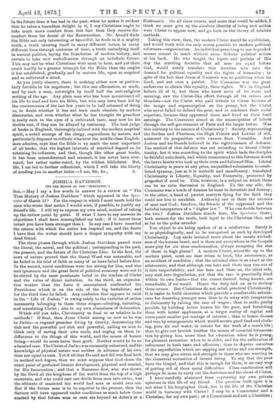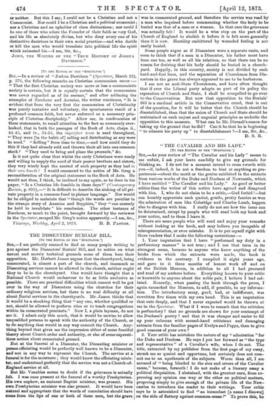JOSHUA DAVIDSON.
[TO THE EDITOR OF THE " SPECTATOR:1
'SIR,—May I say a few words in answer to a review on " The True History of Joshua Davidson" which appeared in the Spec- tator of March 22? For the respect iu which I must needs hold the .man who wrote that notice I would wish, if possible, to justify my friend's life. I will try to express my own mind, instead of taking up the review point by point. If what I have to say answers its 'objections I shall have accomplished my task ; if it leaves them 'intact you have been stronger than I. In any case I have recorded the esteem with which the notice has inspired me, and the desire I have that the writer should have a deeper sympathy with my dead friend.
The three phases through which Joshua Davidson passed were the literal, the moral, and the political ; corresponding to the past, the present, and the future of the Christian Idea. In the first, the laws of nature proved that the literal Word was untenable, and lie failed in his trial of faith as many of us have failed before him. In the second, social conditions were too strong for him, and vice And ignorance and the great facts of political economy were not to 'be stirred by the most passionate belief in the wisdom of Christ and the value of direct imitation. In the third, an organisa- tion weaker than the force it encountered confronted the Providence which is on the side of the big battalions ; and lor the third time he failed. Any confusion that appears to exist in the " Life of Joshua " is owing solely to the varieties of action necessarily belonging to these three stages—obeying, imitating, and translating Christ ; also to my own clumsiness of delineation.
Which will you take, Christianity as final or as relative in its methods ? If final, then Jesus Christ among us now as he was in Judma—a vagrant preacher living by charity, denouncing the rich and the powerful qua rich and powerful, calling on men to -think only of saving their own souls, and urging on them in- difference to the things of this world, and the means of honest living—would do more harm than good. Neither would he be an -educated man. The Christ of Judwa was eminently unlearned, and his knowledge of physical nature was neither in advance of his own time nor equal to ours. Yet if all that He said and did was final both in method and degree, then we must suppose that God chose the exact point of perfected human development, physical and mental, for His Incarnation ; and that a Nazarene Jew, who was shown by the Devil all the kingdoms of the world from the top of a high mountain, and who could cast out devils from men into swine, was the ultimate of manhood the world had seen or could ever see. But if the future man is to be superior to the present, then the Saviour will have appeared under conditions as much below those reached by that future an as ours are beyond an Aztec's or a Bushman's. On all these counts, and more that could be added, I think we must give up the absolute identity of being and action were Christ to appear now, and go back ou the theory of relative methods.
Taking this view, then, the modern Christ would be a politician, and would work with the only means possible to modern political reformers—organisation. An individual preaching to our degraded masses cannot do much without some definite political action at his back. He who taught the lepers and pariahs of His day the startling doctrine that all men are equal before God, would surely translate that doctrine now into the demand for political equality and the rights of humanity ; in spite of the fact that Jesus of Nazareth was no politician when he lived, and not even a patriot. The Commune was the great endeavour to obtain this equality, these rights. We in England believe ill of it, but those who knew more of its roots and meaning, saw the Christ-like effort through all its crimes and blunders—not the Christ who paid tribute to Caesar because of the image and superscription on the penny, but the Christ who never failed to defend the poor, and to condemn their social superiors, because they oppressed theta and lived on their hard earnings. The Commune aimed at the emancipation of labour through the self-government of Paris and the larger towns. Was this contrary to the essence of Christianity ? Society, representing the Scribes and Pharisees, the High Priests and Levites of old, answered its proposition with cannon from Versailles. And Joshua and his friends believed in the righteousness of defence. The method of that defence was not according to literal Chris- tianity, but it was according to the spirit which bade the disciples be faithful unto death, and which consecrated to this foreseen death the brave hearts who took up their cross and followed Him. Literal Christianity is peace at any price, unqualified submission to estab- lished tyranny, just as it is unthrift and mendicancy ; translated Christianity is Liberty, Equality, and Fraternity, protected by grapeshot if need be. This, however, is a subject on which there can be no calm discussion in England. To the one side, the Commune was a horde of demons let loose to devastate and destroy; to the other, a band of patriot martyrs dying for the faith they could not live to establish. Authority saw in them the enemies of man and God ; freedom, the friends of the oppressed and the faithful interpreters of a "higher law." Who can decide between the two ? Joshua Davidson stands here, the Spectator there; both earnest for the truth, both loyal to the Christian idea, and as far as the poles asunder.
You object to sin being spoken of as a misfortune. Surely it is so physiologically, and to be recognised as such by developed Christianity. Lay aside isolated texts about the innate wicked- ness of the human heart, and is there not everywhere in the Gospels more pity for sin than condemnation, always excepting the sins of those in high places? A modern Christ, scientific up to the modern point, must see that crime is bred, like aristocracy, as an accident of condition ; that the criminal class is as exact as the aristocratic, and that although one here and there may rise out of it into respectability, and one here and there on, the other side, may sink into degradation, yet that the race is practically fixed within its own limits—that the causes thereof, being known, are remediable, if we would. Hence the duty laid on us to destroy those causes. But Christians do not relish practical Christianity. It is eajsier to build churches which provide a comfortable subsist- ence for deserving younger sons than to do away with temptation to dishonesty by raising the rate of wages ; than to make purity possible by building better houses for the poor, and furnishing them with better appliances, at a larger outlay of capital and consequent smaller percentage of interest ; than to lessen disease and vice by arrangements which would secure good food and cloth- ing, pure air and water, in return for the work of a man's life ; than to give our brutish brother the means of essential humanisa- tion by giving him more time for education when he is young, for pleasant recreation when he is older, and for the cultivation of refinement in both taste and affection ; than to deprive ourselves of the superfluities which are sapping our virtue and our strength, that we may give virtue and strength to those who are wanting in the elemental necessities of decent living. To say that the poor have the Gospel, and that this is enough for them, is an easy way of getting rid of these social difficulties. Class combination will perhaps do more to carry out the doctrines and the views of Christ.
I have carefully abstained from expressing my own private opinions in this life of my friend. The question built upon it is not what I his biographer think, but is the life of the Christian world in harmony with Christ? I may be a Communist and a Christian, for my own part ; or a Communist and not a Christian ;
or neither. But this I say, I could not be a Christian and not a Communist. Nor could I be a Christian and a political economist; nor a Christian and an upholder of class distinctions; nor could I be one of those who adore the Founder of their faith as very God, and his life as absolutely divine, but who deny every one of his distinctive doctrines in their own social practice—and who deride or kill the men who would translate into political life the spirit which animated his.—I am, Sir, &c., JOHN, THE WRITER OF THE "TRUE HISTORY OF JOSHUA DAVIDSON."



































 Previous page
Previous page